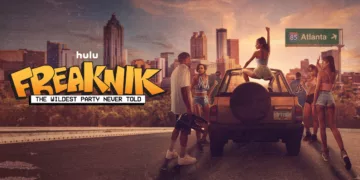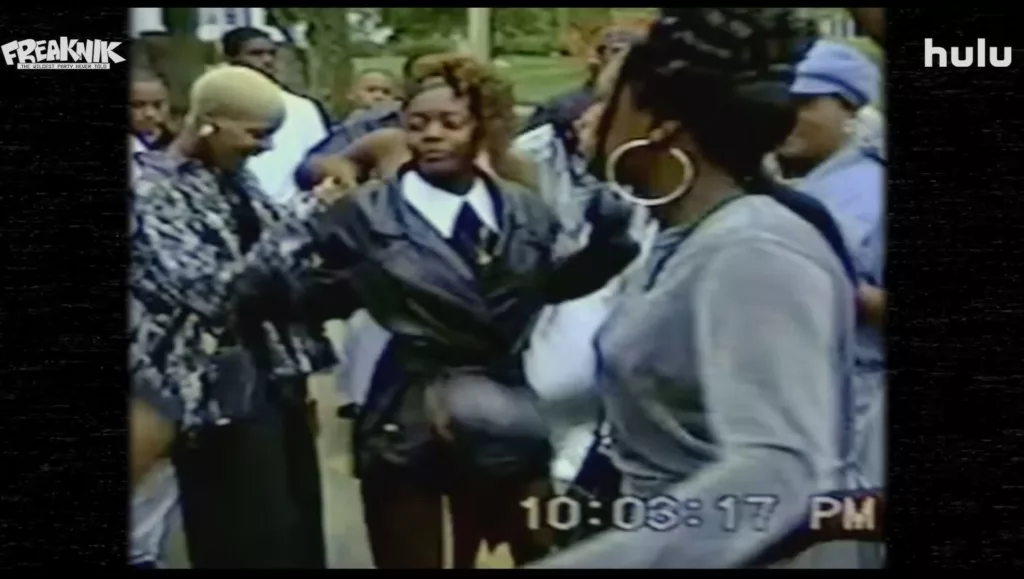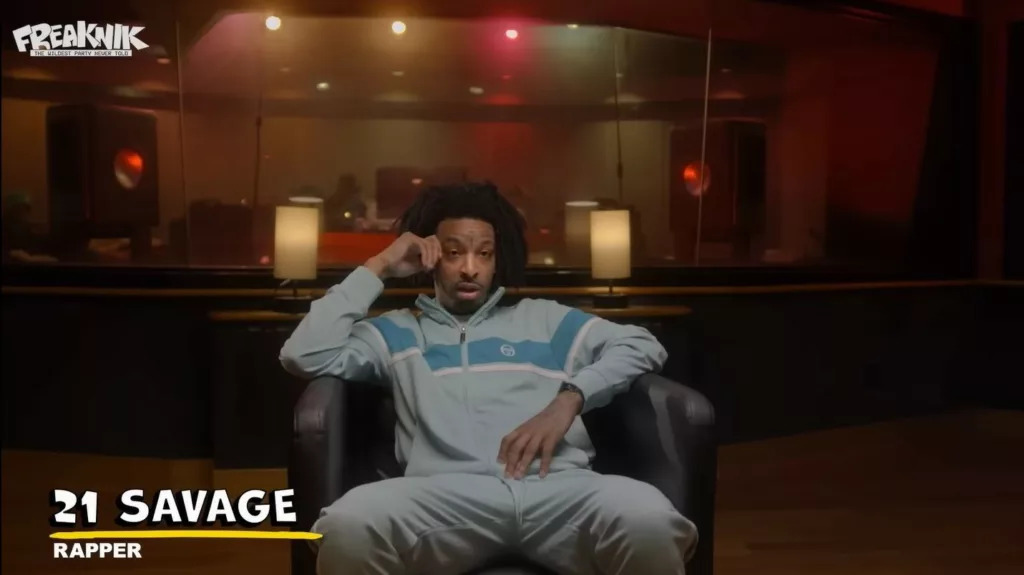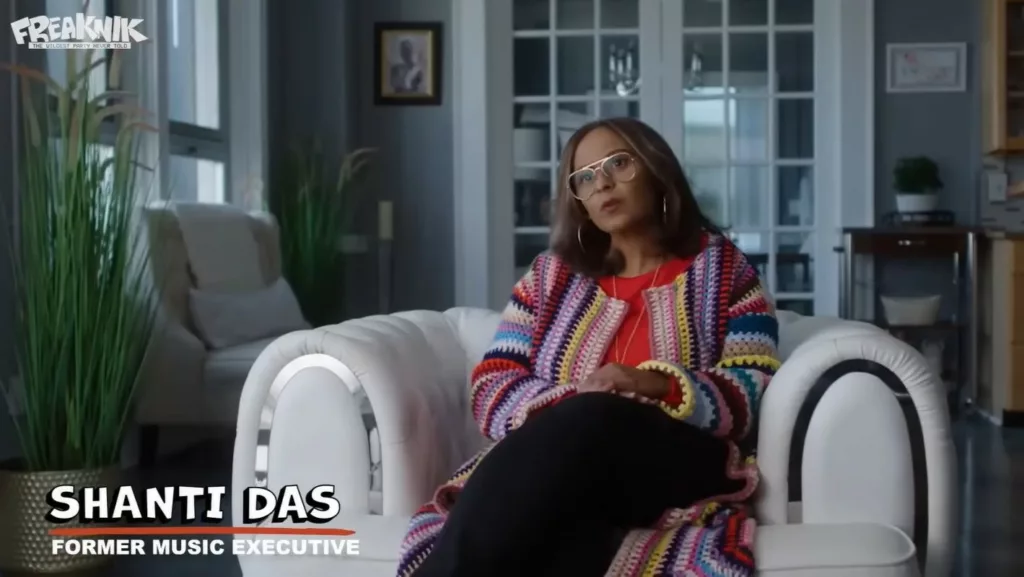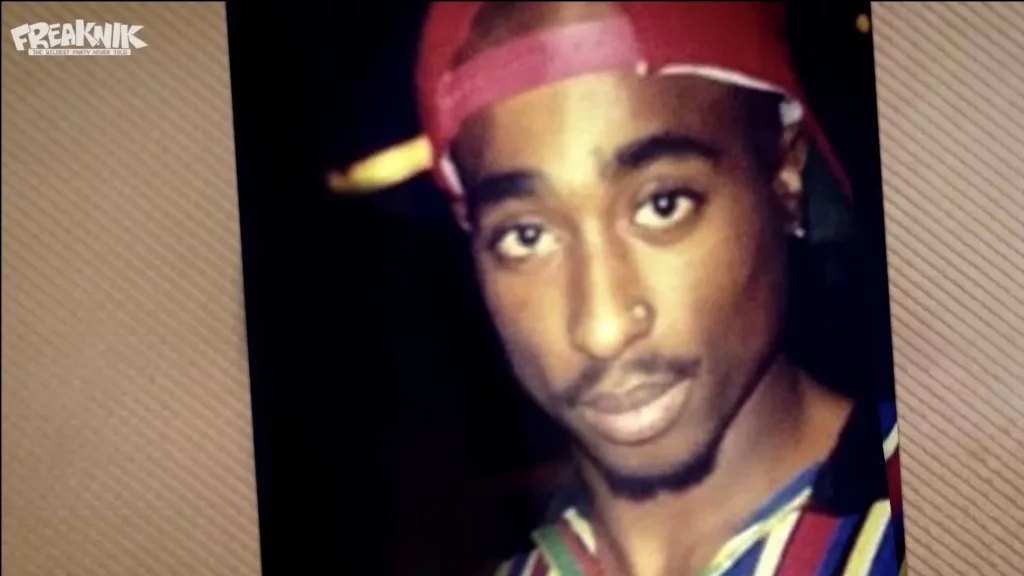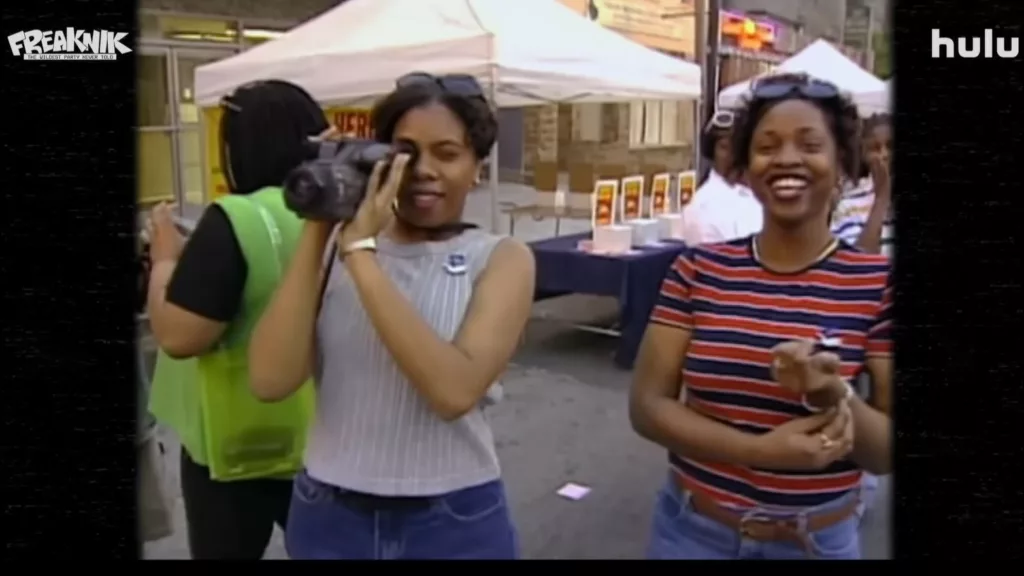What started as a small gathering of students has grown into a quintessential piece of Atlanta history. Freaknik was an annual spring break festival that emerged from humble origins in the 1980s to attract hundreds of thousands of young people to the streets of Atlanta. Through interviews and archival footage spanning decades, the new documentary Freaknik: The Wildest Party Never Told tracks the evolution of this cultural event and its significance over time.
The film begins by reuniting the founders responsible for the very first Freaknik picnic in 1983. A group of students from Atlanta’s historically black colleges sought an alternative to going home for spring break. Inspired by the disco hit “Le Freak,” they organized an afternoon cookout in Piedmont Park, little imagining what it would become. Through the founder’s recollections and generous word-of-mouth, the low-key picnic grew steadily in size and fame throughout the 1980s.
By the 1990s, Freaknik had exploded into a full-fledged street festival, attracting hundreds of thousands of attendees. Promoted through a thriving hip-hop scene and increasingly visible black culture, it put Atlanta on the map as a major destination. Artists, politicians, and cultural figures offer a rare insider’s perspective on the unique time and place Freaknik captured. Archival footage also transports viewers straight back to the enormous traffic-clogging parties across the city. However, tensions and changes were brewing that would alter Freaknik’s freewheeling course.
Freaknik’s Fruitful Start
For Emma Horton, Sharon Toomer, and Amadi Boon, it began as a simple solution to a common spring break problem. As students at schools in Atlanta University Center in the early 1980s, they found themselves stranded in the city when classmates dispersed across the country. Looking for a fun distraction, the D.C. natives decided to host a little picnic in nearby Piedmont Park. Little did they know the seeds they were planting.
In interviews for the documentary, those early organizers light up, sharing how their small idea blossomed. Only 150 or so showed up that inaugural year of 1983, but they packed plenty of good food and brought the energy. It was a celebration of fellowship and a chance for these scholars to unwind outside of classrooms and dorm life. Nobody thought much of it at the time, besides a pleasant afternoon.
Yet soon, the headcount was growing exponentially through word of mouth alone. Nobody bothered with flyers or promotions; the picnic’s positive vibes served as enough recommendations. Before long, it became an annual tradition that locals looked forward to. The numbers swelled into the thousands as more HBCUs got involved. Jermaine Dupri reminisced about first learning about it from Morehouse buddies, anxious to check out what all the campus buzz was about.
For the founders, witnessing the picknick explode into a community staple has been gratifying. Their carefree gathering became a place where young minds from across the map intersected. Luke Campbell also joined the fun during these early college days. He mused at how innocent it was—simply black students cutting loose without scrutiny. It was the start of something vibrant taking shape in Atlanta. Something that would leave an indelible mark on the culture and the city.
Who could have seen it all beginning with three friends seeking a refreshing break from books? Their little picnic wound up planting freedom’s seeds, helping Atlanta flourish as a city people still find themselves drawn to decades later.
Freaknik Finds its Groove
It was a time when more and more people were starting to see what Atlanta was all about. Movies like School Daze that were filmed around town opened eyes to the city’s vibrant HBCU culture. And the hit TV show A Different World gave a wink to Freaknik in one episode, fueling interest in this annual picnic event happening down south. Word was spreading that this was the place to be for fun in the spring sun.
More and more folks from all backgrounds were coming out to Piedmont Park each year. Jermaine Dupri played a big part in that; as a local DJ and up-and-coming record producer, he saw Freaknik as a chance to promote the talent he was working with. Sure enough, his mixtape blasting from car windows helped cement slabs like Outkast on the scene. It was a grassroots marketing campaign before such things existed, and Dupri’s ear for what people wanted to dance to kept the energy high.
With numbers swelling in the tens and then hundreds of thousands, Freaknik took on a vibe all its own. For attendees, it was a freeing environment where everyone could just let loose and celebrate community.
As Rasheeda recalls, “We were finding ourselves and celebrating each other in a way that said we are excellent just as we are.” Things did shift in ’93 when Luke Campbell and his brand of bass-heavy beats entered the picture. He helped push expression to another level, for better or worse, as passions ran high.
By the mid-90s, Freaknik had reached its peak. Folk were finding new confidence in living as their full selves without fear of judgment or rules. Whether cruising down the strip or pulling up to Magic City, you could feel the liberating spirit in the Atlanta air that weekend. It was a one-of-a-kind environment that lets folks appreciate each moment as it comes, instead of a carefully crafted image for the world to see. A special time when, as Too Short put it, “We didn’t care who was watching—this was our time.”
Freaknik’s Influence
Freaknik put Atlanta squarely on the cultural map during the 1980s and 1990s. Starting as a small gathering for black college students, the spring break festival quickly exploded, attracting tens of thousands annually. Music was central to its rise; the thriving hip-hop scene in Atlanta provided the soundtrack. Pioneers like OutKast gained crucial exposure through mixtapes handed out in Freaknik traffic jams.
Magic City strip club also grew alongside Freaknik, its fame spreading nationwide. Participants recall the locale being packed wall-to-wall. The economic impact was immense; hotels, clubs, and local businesses stayed busy for the packed weekend. Yet it wasn’t without issues. Traffic crippled the city as participants descended. Parties spilled outdoors, angering some residents with noise and trash complaints.
Both benefits and drawbacks increased as Freaknik’s scale did. Its cultural significance resonated far beyond Atlanta. For many black youth across America, Freaknik represented freedom and the celebration of identity. They flocked to be part of something pioneering.
Atlanta reaped rewards as a destination, but handling the massive crowds proved a challenge. Freaknik thrust the city’s vibrant creative scene into the spotlight, yet while managing its popularity, tensions remained. Its legacy is an example of culture and economics aligning—for better or worse—to change urban and social landscapes.
Freaknik’s Flaming Out
What began as a small gathering of college friends looking for fun over spring break had, by the mid-90s, engulfed the entire city of Atlanta. Reports of gridlock stretching for miles and impromptu parties popping up across town painted the picture of an event that had truly taken on a life of its own.
Of course, such rapid growth was sure to ruffle some feathers. Local business owners saw empty hotels and convention centers when thousands opted to spend their weekends at Freaknik instead. Meanwhile, some residents grew tired of the traffic jams, and complaints about public drunkenness mounted. As Atlanta prepared its bid for the 1996 Olympics, city officials may have seen the uncontrolled shindig as an embarrassment to curb.
Critics argue racism played a role too, pointing to the stark difference in how authorities tolerated the largely black crowds versus other celebrations. While throngs descended on Atlanta year after year, it took just one violent incident for calls for crackdowns to reach a fever pitch.
Sadly, as the festival’s popularity soared, so too did instances of misbehavior. Reports of groping and assault first raised concerns for women’s safety at the event. Longtime attendees recall the atmosphere changing as newcomers treated it more as an excuse to misbehave than a celebration of community.
By 1996, Mayor Bill Campbell had seen enough. With the Olympics around the corner, a massive police intervention brought Freaknik to an abrupt and unceremonious end. Its fiery flaming out seemed almost destined after losing touch with the spirit of fun and togetherness that fueled its early years. Though short-lived, Freaknik left an indelible mark on both the city and generations of festivalgoers who continue to look back with fond memories of its wild peak.
Nostalgia for the Good Times of Atlanta’s Freaknik
The free-spirited gatherings of Freaknik helped put Atlanta on the map as a cultural powerhouse. For those brief weekends each spring, the city became a rolling street party that welcomed black joy and creativity with open arms. Piedmont Park and the surrounding areas teemed with dancing, music, and unrestricted self-expression.
It was within this unique environment that Southern hip-hop began to truly flourish. Future legends like Outkast seized the moment, handing out demo tapes from jam-packed cars and launching their sounds across the scene. The Souls of Mischief, Goodie Mob, and other seminal acts also credit Freaknik gatherings as tremendously helpful in growing their brands. This flowering of musical talent ensured Atlanta’s ongoing legacy as the capital of Dirty South rap.
Modern revivals have tried recapturing Freaknik’s magic, but something is always lost without the carefree abandon of the early years. When crowds were just happy to celebrate within a hard-won, safe space, unconcerned with likes or follows, As 21 Savage insightfully notes, “They knew how to have fun. The world was way more, like, pure. It was something organic and real, and just for the people.” Freaknik allowed the expression of an authentic culture before image and profit took center stage.
Its influence lives on through the up-and-coming acts who walk in the footsteps of those it inspired. And in the memories of those lucky enough to experience it firsthand, who still feel its joyful spirit wherever they hear that vintage Southern beat rocking a city street once more. Though the party is over, Freaknik’s legacy helps tell the ongoing story of a community whose greatness can’t be contained.
Freaknik’s Cultural Impact
While the nostalgic atmosphere of Freaknik: The Wildest Party Never Told was evident and its exploration of a pivotal time in Atlanta’s history was appreciated, there seemed to be an undercurrent desire from audiences for deeper examination. A sense that merely skimming the surface was not enough to do justice to the profound cultural significance of the festival.
Viewers seemed eager to peer below superficial reflections to gain a richer understanding of Freaknik’s origins and lasting impact and how it helped shaped the communities it brought together through celebratory self-expression and social change.
A yearning was perceptible for the documentary to burst past surface recollections and more thoroughly unpack the cultural phenomenon in all its complexity through a probing contextual lens that could have amplified appreciation and learning for both past participants and newer viewers alike.
Deeper context was desired to help outsiders grasp Freaknik’s significance. While it celebrated Black Joy, it happened against a backdrop of challenges to racial norms in the New South. And its meteoric rise coincided with Atlanta making its mark as a center of black entrepreneurship, politics, and the arts. More could have been said about these parallels and periods of progress.
Some noted an over-reliance on male viewpoints, with women’s experiences reduced to bit parts. But framing sexuality as solely about male gratification felt reductive, glossing over how Freaknik empowered self-expression at a time of shifting social mores. Greater female contributions could have provided a fuller portrait, avoiding objectification.
Similarly, the documentary stuck largely to nostalgic reminiscence rather than probing the differing theories around Freaknik’s demise. More thorough vetting of the claims around crime, backlash, and city leadership’s maneuvering may have unearthed deeper truths and lessons.
While happy to daydream in Freaknik’s sun-soaked memories of cars and music, I am left wanting a little more meat on the bones—more context to grasp the full cultural statement being made in those halcyon park-jammed weekends. With a bit more depth and breadth, this film could have truly done justice to the pioneering spirit it commemorated.
Freaknik’s Joyous Legacy
They succeeded in capturing the unforgettable spirit of Freaknik. Through archival footage and interviews with those who were there, viewers are taken back to a time when young black people from across the country would flock to Atlanta each spring to let loose and celebrate themselves freely.
It wasn’t just any party; it was an inspiring cultural movement. What began as a small picnic evolved into a massive festival that highlighted the dynamism and resilience of black communities. Freaknik put Atlanta on the map through the vibrant expressions of its attendees, from cutting-edge fashion to music that would help establish the city as the capital of Southern hip-hop.
For those who were part of it, the film reignites joyous memories of an era when social media didn’t yet dictate experience and communities united through genuine human connection. You can feel the empowerment people felt in being able to fully embrace who they were. Those who weren’t around may be unfamiliar with this influential period, but the documentary brings its infectious spirit to life.
By acknowledging both the positive impact and challenges the gathering faced, the film tells an important story about Atlanta’s history and the power of black joy. Whether you’re looking to feel nostalgic or learn about a culturally rich time, I strongly recommend streaming this documentation of Freaknik’s inimitable legacy. It’s a glimpse into both the past and a vibrant culture that continues to inspire new generations to live freely.
The Review
Freaknik: The Wildest Party Never Told
Freaknik: The Wildest Party Never Told succeeds in taking viewers back to enjoy the unbridled fun and cultural significance of the storied festival. By blending audiovisual memories with insightful commentary, it honors Freaknik's role in empowering black communities and advancing Atlanta on the national stage. While barely scratching the surface of such a massive phenomenon, the documentary reignites the rebellious spirit of its namesake gathering in a way that will entertain both participants eager to feel nostalgic as well as audiences curious about its indelible impact.
PROS
- It evokes nostalgia for those who experienced Freaknik.
- Offers a glimpse into an influential period for black culture and Atlanta's history.
- Features insightful interviews and commentary on cultural phenomena
- Excellent use of archival footage transports viewers back in time.
CONS
- Only scratches the surface of Freaknik due to the short runtime
- The narrative jumps somewhat disjointedly between topics.
- More female perspectives were needed to balance male views.
